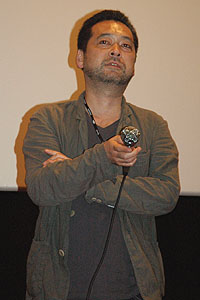There were interesting Japanese works in Jeonju. The first one I was able to see was the (now not-so-)short Tsukamoto Shinya's Haze. The film was conceived for the Digital Short Films project of the previous year, and was now presented in a 50 minute version — 20 minutes longer than the original. As with Song Il-gon's Magicians, which followed on the same screening, Haze uses the digital medium in an aesthetically attractive way, without the plain, cool and clean look characteristic of many DV shorts.
The synopsis of Tsukamoto's film might bring memories of Vicenzo Natali's Cube, but the similarities stop at the basic setting where characters are placed at the beginning. In both cases we start with someone waking up in a confined space having lost the memories on how he/they got there. The film is very effective creating tension and anxiety, during its characters' journey of physical and psychological pain; he drags himself horizontally or vertically, in-between narrow cement walls and has to support part of his weight with his teeth biting into a metal pipe, moving along the way, unable to completely set his feet on the barbed wire floor.
Sometimes an essay on sadism, Haze slightly disappoints with an ending which tries to supply answers, something which I think was absent from the short version.
Zeze Takahisa's Mrs. mixes family drama, mystery thriller and a bit of sexploitation. Zeze is referenced as an author of pinku eiga — a term that applies to a variety of Japanese erotic films. The same script would work quite well without the carnality, but I will not complain about the colourfulness it provides, especially since the film nevers backs off with shame like some others do, provoking and then holding out and behaving.
Mrs. begins with a woman entering a cab, falling asleep and finding herself chained to the car. Through flashbacks, we'll learn her relation with another woman and her drama: her son was missing, apparently kidnaped, and her marriage crumbled down. The narrative is spiced up with a few moments of love between women — surprisingly free of optical censorship (in the name of art, I assume).
 |
| Zeze Takahisa answered audience questions on his film Mrs. |
The major strength of the film is its characters, the weakness the not really nice DV look. Some DV films look acceptable or good; others just make us scream "35mm please!". The image seemed slightly distorted, even though in general the digital projection on the JIFF was excellent. The problem, if there was one (it could be something I ate that day), could have been in the image source.
Yanagimashi Mitsuo directed Who's Camus Anyway? (Camus Nante Shiranai), a film about a film, stuffed with cinephile references, from its opening with a long continuous shot where characters talk about long continuous shots (Altman's The Player, Wells' Touch of Evil).
Film students try to take to good term the production of a thriller called "The Bored Killer". It all starts on a lighter note, but then it gets deeper and with an ironic sense of humour. The main actor (The Bored Killer himself) searches for enlightenment on the motivations for his character to kill people and there is an intense discussion on the subject amidst the students, from where a question arises: can someone kill another person just to know how it feels? The ending, which continues through the end credits is a bit dubious and might disappoint those who would expect well defined resolutions.

